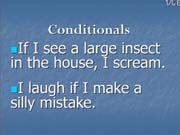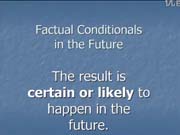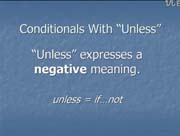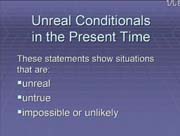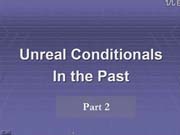|
|
Five Tips to Improve Your Writing

Five Tips to Improve Your Writing
3 Past Tenses

3 Past Tenses
Action Verbs vs. State Verbs

Action Verbs vs. State Verbs
All English Tenses

All English Tenses
American vs. British - Driving Vocabulary

American vs. British - Driving Vocabulary
American vs. British English - Food Vocabulary

American vs. British English - Food Vocabulary
Apostrophe S, after S (English Spelling)

Apostrophe S, after S (English Spelling)
Basic English Grammar - Adjectives vs. Adverbs

Basic English Grammar - Adjectives vs. Adverbs
Basic English Grammar - Articles A, An, The

Basic English Grammar - Articles A, An, The
Basic English Grammar - Articles II - A, An, and The

Basic English Grammar - Articles II - A, An, and The
|

Conditional If Sentences
Level - Intermediate-Advanced
Learn the Zero, First, Second, and Third Conditionals.
*Listening Comprehension

Mixed Tenses Exercises
Level - Intermediate
Practice your tenses. Learn the difference between-
-Do
-Did
-Doing
-Have done
-Will do
-Will be doing
*Listening and Reading Comprehension

Future Tense - Will and (Be) Going To
Level - Intermediate
Learn different ways to talk about the future-
-I will do something
-I am going to do something.
*Listening and Reading Comprehension

3 Past Tenses
Level - Intermediate
Past Continuous, Past Perfect, & Past Perfect Continuous
Learn different ways to talk about the past-
-I was doing something
-I have done something
-I have been doing something.
*Listening and Reading Comprehension

All English Tenses
Level - Intermediate
Learn and review all the tenses in English-
-I do
-I am doing
-I have been doing
-I have done
-I did
-I will do
-I am going to do
-I am doing + future
-I was doing
-I had done
-I had been doing
-I will be doing
-I will have done
-I will have been doing.
*Listening and Reading Comprehension

Make vs. Do
Level - Intermediate
Learn how to use make and do as main verbs, learning phrasal verbs and expressions
-Make + a chair, a coffee, a mistake, an error, something possible
-Do + your shopping, exercises, hair, make-up
*Listening and Reading Comprehension

Action Verbs vs. State Verbs
Level - Intermediate
Action Verbs = something you can start and stop doing
State Verbs = a mental state, you cannot start and stop
*Listening and Reading Comprehension

Basic English Grammar - Articles A, An, The
Level - Beginner-Intermediate
When do you use A, AN, and THE?
I will go to a (any) bank. I will eat an apple. I will go to the (my) bank.
*Listening and Reading Comprehension

English Idioms - Birds
Level - Intermediate-Advanced
Learn common sayings in English with the word - bird.
*Listening Comprehension

English Idioms - Hand
Level - Intermediate-Advanced
Learn common English sayings with - hand.
*Listening Comprehension

English Idioms - Hold
Level - Intermediate-Advanced
Learn common English sayings with the word - hold.
*Listening Comprehension

Learn English More Effectively
Level - Intermediate
Be interested, ask questions, study hard, review, review again, and use the information.
*Listening Comprehension

Must vs. Have to
Level - Intermediate
It must be raining outside.
I must work tomorrow.
I have to work tomorrow.
*Listening and Reading Comprehension

Passive Voice
Level - Intermediate
Something is always done.
Something was done in the past.
Something is being done now.
Something will be done in the future.
Something has already been done.
*Listening Comprehension

More Passive Voice
Level - Intermediate
-Something is always done.
-Something was done in the past.
-Something is being done now.
-Something will be done in the future.
-Something has already been done.
*Listening Comprehension

Past Simple vs. Present Perfect
Level - Intermediate
What is the difference between - I did - and - I have done?
I went to Spain 10 years ago, and I have gone to Spain twice since then.
*Listening Comprehension

Phrasal Verbs - On
Level - Intermediate
Learn common phrasal verbs with - on.
Remember other phrasal verbs with - up, down, on, off, in, out, back, forward, away, through.
*Listening and Reading Comprehension

Phrasal Verbs - Pull
Level - Intermediate-Advanced
Learn common phrasal verbs with - pull.
Remember other phrasal verbs with - up, down, on, off, in, out, back, forward, away, through.
*Listening and Reading Comprehension

Phrasal Verbs - Turn
Level - Intermediate-Advanced
Learn common phrasal verbs with - turn.
Remember other phrasal verbs with - up, down, on, off, in, out, back, forward, away, through.
*Listening and Reading Comprehension

Phrases vs. Clauses
Level - Intermediate-Advanced
Phrase = Batman
Clause = Superman
What? Watch to learn why!
*Listening and Reading Comprehension

Reading Comprehension
Level - Intermediate
Do you really understand what you read?
Learn skills how to understand what you read.
*Listening and Reading Comprehension

Root Words - Port
Level - Intermediate
Can you think of any words with - port?
Think of air...
*Listening and Reading Comprehension

Say, Tell, Hear, and Listen
Level - Intermediate
What is the difference between say and tell?
What about hear and listen?
Watch at this video, and you will see!
*Listening and Reading Comprehension

Used to vs. Be used to
Level - Intermediate
Learn the difference between used to and am/are/is used to.
I used to eat American food, but living in China, I am now used to eating Chinese food.
*Listening and Reading Comprehension

Be Going To vs. Will
Level - Beginner-Intermediate
Are they the same?
Learn some VERY SMALL differences between them.
*Listening and Reading Comprehension

Heteronyms - 1 Spelling, 2 Pronunciations
Level - Beginner-Intermediate
Heteronym = words with one spelling but more than one pronunciation
More examples - read, record, produce, attribute, bow, close, contract, desert, dove, drawer, live, perfect, putting, rebel, refuse, resume, sake, separate, subject, wind, wound
*Reading Comprehension
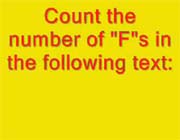
Reading Test Practice
Level - Intermediate
Read this at natural speed!
DO NOT stop the video!
*Reading Comprehension

Basic English Grammar - How to Show Possession
Level - Beginner
This lesson is on possessive adjectives and pronouns.
Learn different ways to talk about subjects - I, you, he, she, it, we, they.
Possessive Adjectives are - my, your, his, her, its, our, their.
Pronouns are - mine, yours, his, hers, its, ours, theirs.
*Listening and Reading Comprehension

Basic Grammar - Is or It's
Level - Beginner
This is a common mistake made by many non-native English speakers. Learn the difference between Is and It is.
You can only begin a sentence with the TO BE verb (Is, Am, Are, Was, Were) if it is a question.
*Listening and Reading Comprehension

Five Ways to Say Sorry - Polite English
Level - Intermediate
Learn how to use - Sorry! Im sorry! Im (really, very, terribly, deeply, extremely) sorry! Im sorry about/for (something)! My apologies. I apologize for (something/doing something).
Also, learn ways to respond to these apologies.
*Listening and Reading Comprehension

English Idioms - Dogs
Level - Advanced
Learn how to use the idioms -
-Dog eat dog world
-Sick as a dog
-Every dog has its day
-It is a dogs life
-Top dog
-You cant teach an old dog new tricks
*Listening and Reading Comprehension

Five Ways to Say Goodbye in English
Level - Beginner
Learn how to use the common ways to say goodbye -
-See ya!
-Take it easy!
-Have a good one!
-Take care!
-Catch ya later!
*Listening & Reading Comprehension, and Speaking Practice

Six Phrases in English Using It's
Level - Advanced
Learn how to use the phrases -
-It is touch and go
-It is a hairy situation
-It is about time
-It is on me
-It is on the house
-The early bird gets the worm
*Listening Comprehension

Six Simple Phrasal Verbs
Level - Beginner
Phrasal Verbs = verb + preposition
Learn how to use -
-Wake up
-Get up
-Turn on
-Turn off
-Sit down
-Stand up
*Listening & Reading Comprehension, and Speaking Practice

Six Words With Meanings That Will Surprise You
Level - Intermediate
Remember that dictionaries are not always correct. Many words have more than one meaning!
Look at the context to understand the meaning.
Learn the meanings of the following words-
-Wear (noun)
-Meet (noun)
-Mean (adjective)
-Make (noun)
-Milk (verb)
-Water (verb)
*Listening & Reading Comprehension

Seven Common School Expressions in English
Level - Intermediate-Advanced
Learn how to use the common school expressions -
-Bookworm
-Learn by heart
-Ace something
-Teachers pet
-Play hooky
-Cut class
-Flunk out
*Listening & Reading Comprehension

Seven Common English Expressions about Money
Level - Intermediate
Learn the meanings and use of the following expressions -
-Loaded
-Make a killing
-Make ends meat
-Hand to mouth
-Pay an arm and a leg
-Pinch pennies
-Put in your two cents
*Listening & Reading Comprehension, and Speaking Practice

Commonly Confused Words in English - Nine Homophones
Level - Intermediate
Homophones are words that sound the same but have different meaning.
-byte, bite
-hear, here
-sense, cents
-ate, eight
-Czech, check
-cell, sell
-clothes, close
-cereal, serial
-chews, choose
*Listening & Reading Comprehension, and Speaking Practice

Ten Common Expressions in English
Level - Intermediate
Learn the meanings and usage of -
-twenty-four seven 24/7
-Get the ball rolling
-Take it easy
-Sleep on it
-To be broke
-7:00 sharp
-like the back of my hand
-Give me a hand
-in ages
-sick and tired (of)
*Listening & Reading Comprehension, and Speaking Practice

Ten Common Verbs Followed by Infinitives
Level - Intermediate
Infinitive - to + (verb)
Gerund - (verb) + ing
-like to do / like doing
-enjoy doing
-want to do
-hope to do
-agree to do
-plan to do
-decide to do
-choose to do
-promise to do
-need to do
*Listening & Reading Comprehension, and Speaking Practice

English Grammar - A lot, Alot, Lots, Allot, A Whole Lot
Level - Intermediate
Learn a mistake that both English students and native English speakers make.
Watch to find out the usage of these terms.
Also learn about countable and uncountable nouns.
*Listening & Reading Comprehension, and Speaking Practice

Three Common Conversation Mistakes
Level - Advanced
1. Pronunciation mistake - stuff vs. staff
2. Will vs. would
3. Near to vs. close to
*Listening & Reading Comprehension

Common English Errors - I or Me? She or Her?
Level - Beginner
Learn how to differentiate when to use pronouns and subjects and objects.
-I vs. me
-You vs. you
-He vs. him
-She vs. her
-We vs. us
-They vs. them
*Listening & Reading Comprehension, and Speaking Practice

Common English Errors - Someone, Anyone, No one
Level - Beginner-Intermediate
Learn the uses of the following
-Someone / Anyone / No one
-Somebody / Anybody / Nobody
-Something / Anything / Nothing
-Somewhere / Anywhere / Nowhere
*Listening & Reading Comprehension, and Speaking Practice

Common Mistakes in English - Choose vs. Choice
Level - Intermediate
Learn the difference on how to use -
-Choose (simple present verb)
-Chose (simple past verb)
-Choice (noun)
*Listening & Reading Comprehension, and Speaking Practice

Common Mistakes in English - Could of, Could have
Level - Intermediate-Advanced
Many native-English speakers make the same mistake using these modal verbs!
-Would have vs. would of
-Could have vs could of
-Should have vs. should of
*Listening & Reading Comprehension

Basic English Grammar - To Be
Level - Beginner
Learn how to use the verb - to be - in English
-I am
-He is
-She is
-It is
-You are
-We are
-They are
*Listening & Reading Comprehension

Common Mistakes in English - Soon, Early, Quick, Fast
Level - Beginner-Intermediate
Learn the difference between these words -
-Soon - a short time after now
-Early - near the beginning of the time you are thinking about
-Quickly - refers to speed
-Fast - means able to move quickly, also done in a little amount of time
*Listening & Reading Comprehension, and Speaking Practice

English Grammar - Conditionals - Zero and First Conditionals
Level - Beginner-Intermediate
-Zero Conditional - real situation that is always true
--Example- If you heat water to 100 degrees Celsius, it boils.
-First Conditional - real situations for the future
--Example- If it rains tomorrow, I will stay at home and study English.
*Listening & Reading Comprehension, and Speaking Practice

English Grammar - Conditionals - Second and Third Conditionals
Level - Intermediate
-Second Conditional -unreal situation about the present or future
--Example- If I were a billionaire, I would buy ten Ferraris.
Third Conditional -unreal situation about the past
--Example- If I had woken up early, I would have seen the sun rise.
*Listening & Reading Comprehension, and Speaking Practice

Basic English Grammar - Noun, Verb, Adjective, Adverb
Level - Beginner
Learn the difference between these parts of speech
-Noun (n) person, place, thing, idea, activity
-Verb (v) action word, existing word (be)
-Adjective (adj) describes a noun
-Adverb (adv) Describes a verb
*Listening & Reading Comprehension

Basic English Grammar - Past Tense Questions
Level - Beginner-Intermediate
Learn about how to use the Simple Past tense and how to make questions with this tense.
-Regular Past Tense - worked, finished, cleaned, studied
-Irregular Past Tense - did, ate, went, wrote, read
*Listening & Reading Comprehension, and Speaking Practice

English Vocabulary - Talking About Shopping
Level - Intermediate
Learn the difference between the following words-
-Price - expensive, reasonable, cheap
-Payment - cash, credit card, debit card, check
-Size - too big, fit, tight
-The bill - discount, taxes

English Vocabulary - Look, See, Watch
Level - Beginner
Learn the difference between the following words -
-Look - at this/that, at the newspaper
-See - a movie, a girl/guy, a place
-Watch - tv, a movie
-Read - a book/magazine/newspaper, an article

Basic English Grammar - Using the verb TO BE
Level - Beginner
Learn when we use the verb - to be - in the present, past, and present perfect
-Age - I am 21 years old.
-Gender - I am a man.
-Marital Status - I am not married.
-Feeling - I am happy.
-Job - I am a lawyer.
-Nationality - I am Egyptian.
-Political - I am a conservative.
-Religion - I am Jewish.
-Location - I am in Tokyo.
-Field - I am in IT.
*Listening & Reading Comprehension, and Speaking Practice

Basic English Grammar - This, That, These, Those
Level - Beginner
Learn how to use the locative pronouns. Remember the singular and plural, and near and far.
-This woman is crazy.
-That man on tv is crazy.
-These rats in my house are driving me crazy.
-Those people in Finland are crazy.
*Listening & Reading Comprehension

American vs. British - Driving Vocabulary
Level - Intermediate
Tire - Tyre
Trunk - Boot
Bonnet - Hood
Petrol tank - Gas tank
Fender - Bumper
Stick - Manual/Standard
Directional Signals/Turn sigmals - Blinker/Winker
Muffler - Silencer
Trailer - Caravan
Parking lot - Car park
(Transport) Truck - Lorry
Highway - Motorway
Intersection/Crossroads - Crossing/Junction
Main Street - High Street
Sidewalk - Pavement
*Listening & Reading Comprehension

Basic English Grammar - Was and Were
Level - Beginner-Intermediate
Learn when to use the simple past form of the verb - to be.
Was | Were
I | we
He | they
She | you
It | They
*Listening & Reading Comprehension

American vs. British English - Food Vocabulary
Level - Intermediate
Learn the difference between US and UK English when it comes to food.
Eggplant - Aubergine
Potato chips - Crisps
Baked potatoes - Jacket potatoes
Zucchini - Courgette
Arugula - Rocket/Roquette
Beer - Bitter
Cookie - Biscuit
Dessert - Pudding
Candy - Sweets
Cotton candy - Candy floss
Soda/pop - Soft drink
*Listening & Reading Comprehension

Commonly Confused Words in English - Bring vs. Take
Level - Beginner-Intermediate
Learn the directions connected with Bring and Take.
Bring - (towards) Bring that book to me.
Take - (away from) Take that book away from the baby and bring it to me.
*Listening & Reading Comprehension

English Vocabulary - Lost
Level - Beginner-Intermediate
Learn the uses of the verb lose and lost.
Verb - I lost (something)
Adjective - I am lost now. I was lost yesterday.
Noun - Loser!
*Listening & Reading Comprehension, Speaking Practice

English Vocabulary - Talking About Looks
Level - Intermediate
Learn how to talk about good-looking ant not-so-good-looking people
Vocabulary -
-Handsome
-Pretty
-Good-looking
-Not my type...
-Not my cup of tea...
-A great/nice personality.
-Interesting
-No chemistry...
-I wouldnt touch that with a 10-foot pole!
-Fugly
*Listening & Reading Comprehension

English Vocabulary - How to use - Play, Go, and Do
Level - Beginner-Intermediate
Learn the difference between Play, Go, and Do
Play - tennis, baseball, football, golf
Go - skiing, snowboarding, golfing, swimming
Do - yoga, aerobics, stretches, martial arts (kung fu, karate)
*Listening & Reading Comprehension, Speaking Practice

English Vocabulary - Listen vs. Hear
Level - Beginner
Learn the difference between listen and hear.
-Listen - (paying attention, concentrating) - Are you listening to me talk?
-Hear - (sound, background noise) Did you hear that sound?
*Listening & Reading Comprehension, Speaking Practice

English Vocabulary - Expressions about Love
Level - Intermediate
Learn some common expressions to talk about relationships.
-To hit it off - (get along)
-On the rocks - (a relationship not going well)
-Pop the question - (ask someone to marry you)
-Tie the knot - (to get married)
-To fall head over heels - (to fall completely in love)
-Puppy love - (infatuation/not a serious relationship)
-Settle down - (to have children)
*Listening & Reading Comprehension

English Vocabulary - School Slang
Level - Intermediate
Learn how to use the expressions -
-Pop quiz
-Straight A
-Cram
-Killed (a test)
-Bombing (an exam)
*Listening & Reading Comprehension, Speaking Practice

English Vocabulary - Negative Characteristics
Level - Intermediate-Advanced
Learn how to talk about people you do not like.
-Arrogant -(adjective) an exaggerated view of worth or importance
-Vain -(adjective) very proud of ones looks or abilities
-Brag -(verb) to tell people how wonderful you are
-Snob -(noun) a person who wants to looks down on others by acting superior
-Conceited -(adjective) having a very high opinion of oneself
*Listening & Reading Comprehension

English Vocabulary - First Name Given name
Level - Beginner
Learn the difference between names-
-Full name - John Adam Smith
-First name - John
-Given Name - John
-Forename (writing) - John
-Last name - Smith
-Surname - Smith
-Middle name - Adam
-Initials - J.A.S.
-Middle initial - A.
*Listening & Reading Comprehension

English Vocabulary - Get
Level - Intermediate
Learn the difference uses of the word - Get.
Use get in the present, past, and future tenses.
-She gets a lot of money for her birthday.
-She got a good grade on her test.
-She will get angry if she doesnt get into college.
*Listening & Reading Comprehension

English Vocabulary - Marriage and Divorce
Level - Beginner-Intermediate
Learn how to use the words marry and divroce.
-Will you marry me?
-I want to get married with you.
-I am married.
-My parents had a happy marriage.
-I think we should get a divorce.
-I think we should get divorced.
-My father is divorced.
*Listening & Reading Comprehension, Speaking Practice

English Vocabulary - Getting Dressed and Clothes
Level - Beginner-Intermediate
Learn how to use the folloing words-
-Put on - a dress, hoodie
-Take off - (clothes)
-Put in - contact lenses
-Take out - contact lenses
-Do up - velcro, buttons, snaps, zippers, fly
*Listening & Reading Comprehension, Speaking Practice

English Slang - Text Messaging LOL, WTF, BRB
Level - Intermediate
Learn some great slang for chatting online or text messaging.
-LOL
-BRB
-PLZ
-L8R
-?4U
-OMB
-WTF
-ASAP
-IOU
-Also learn how to use - U, R, 8, 2, 4
*Listening & Reading Comprehension, Speaking Practice

English Vocabulary - How To Talk About Money
Level - Intermediate
Learn how to use basic verbs we use with money
-Deposit
-Withdraw
-Transfer
-Save
-Borrow
-Lend
-Owe
-Spend
-Waste
-Invest
*Listening & Reading Comprehension, Speaking Practice

English Slang - Freak
Level - Intermediate
Learn how to use the English slang term - Freak
-You are a freak
-Freaking out
-He is a freaking idiot!
-Superfreak
*Listening & Reading Comprehension, Speaking Practice

English Speaking - Mistakes and Regrets
Level - Intermediate
Learn how to use - I should have (done something), or I shouldnt have (done something).
Also review a few past participles!
-Regret - a mistake you made in the past
*Listening & Reading Comprehension, Speaking Practice

English - Spelling - When to Use Double Consonants
Level - Intermediate-Advanced
Learn when to you double consonants in spelling
Consonant - B, C, D, F, G, H, J, K, L, M, N, P, Q, R, S, T, V, W, X, Y, Z
Vowel - A, E, I, O, U
CVC Rule - one syllable words with a consonant, vowel, consotant
Comparative - er
Superlative - est
*Listening & Reading Comprehension

English Speaking - How to Ask Permission
Level - Intermediate
Learn how and when to use Can, Could, and May
-Can I borrow your pencil?
-Could I borrow your pencil?
-May I borrow your pencil?
*Listening & Reading Comprehension

English Vocabulary - Appointments and Reservations
Level - Intermediate
Learn the difference between appointments and reservations
-Reservation - (theater, airplane, restaurant)
-Reserve - a table, seat
-Appointment - (doctor, dentis
t
-Plan - hang out, visit
*Listening & Reading Comprehension

English Vocabulary - Afraid, Afraid of, Scared of, Fear
Level - Intermediate
Learn how to differentiate these words-
-Fear - to be filled with fear
-Afraid - Don't be afraid! I know you are afraid of spiders.
-Afraid - (sorry) I'm afraid that I cannot help you.
-Scared - I know you are scared of spiders.
*Listening & Reading Comprehension

English Vocabulary - Assure, Ensure, Insure
Level - Intermediate-Advanced
Learn the difference between the words-
-Assure - To help someone get over anxiety
-Ensure - To make a promise or guarantee
-Insure - To get insurance for something
*Listening & Reading Comprehension

English Vocabulary - Death and Dying
Level - Intermediate
Learn how to use the following words-
-Dead (adjective)
-The dead (noun)
-Death (noun)
-Die (verb)
-Dying (verb)
*Listening & Reading Comprehension

English Vocabulary - End or Finish
Level - Intermediate
Learn the difference between end and finish.
-End (verb and noun)
-Finish (verb and noun)
*Listening & Reading Comprehension

Basic English Grammar - Tag Questions
Level - Beginner
You remember what tag questions are, ____ you?
Use the opposite of the key verb.
( - ), ( + )?
( + ), ( - )?
-are | aren't
-is | isn't
-can | can't
-like | don't
-want | don't
*Listening & Reading Comprehension, Speaking Practice

English Grammar - Tenses Overview - All the Tenses
Level - Intermediate
Learn how to use the verb - to work.
-Present Simple - I work.
-Present Continuous - I am working.
-Past Simple - I worked.
-Past Continuous - I was working.
-Future Simple - I will work.
-Future Simple - I am going to work.
-Future Progressive - I will be working.
-Present Perfect - I have worked.
-Present Perfect Continuous - I have been working.
-Past Perfect - I had worked.
-Past Perfect Continuous - I had been working.
-Future Perfect - I will have worked.
-Future Perfect Continuous - I will have been working.
*Listening & Reading Comprehension

English Grammar - The Subjunctive
Level - Advanced
This is a formal structure to emphasize urgency or importance.
-Suggest
-Recommend
-Important
-Propose
-Advise, ask, command, demand, desire, insist, propose, recommend, request, suggest, urge
*Listening & Reading Comprehension

Basic English Grammar - This, That, These, Those
Level - Beginner
Practice using the locative pronouns and adjectives-
-This - This is my father.
-These - These are my parents.
-That - That is my grandmother.
-Those - Those are my grandparents.
*Listening & Reading Comprehension, Speaking Practice

English Grammar - Writing - Capitalization
Level - Intermediate
Learn when to use upper-case or capital letters-
-Beginnings of sentences.
-Proper noun names of people, places, and things.
*Listening & Reading Comprehension

English Grammar - Vocabulary - Now and Still
Level - Intermediate
Learn the difference between using now and still
-Now - at this exact moment
-Still - started in the past and has continued in the present
*Listening & Reading Comprehension

English Grammar - Modifying Comparatives
Level - Intermediate-Advanced
Learn how to compare things using the following words-
-A lot + (comparative)
-Far + (more + adj.)
-A little + (comparative)
-Slightly + (comparative)
*Listening & Reading Comprehension

English in the News - Vocabulary of Floods
Level - Advanced
Learn to talk about and listen for events in the news.
-People - farmers, labourers, villagers, residents, inhabitants, the homeless, the injured, the destitute, the displaced
-Places - hospitals, fields, villages, farmland, rice paddies, riverbank, flood-hit areas, low-lying regions
-Situation - tragedy, disaster, catastrophe, calamity
-Problems - death, destruction, disease, starvation, misery, hardship
-Actions - to flood, to inundate, to respond, to wade, to warn, to rebuild, to reconstruct, to distribute, to evacuate, to donate, to pledge
*Listening & Reading Comprehension

English Grammar - Reported Speech
Level - Intermediate
Remember when using reported speech, change to the past tense.
Reported speech verbs - told, said, asked
-He told me that he was a teacher.
*Listening & Reading Comprehension

English Idioms - Boot
Level - Intermediate
Learn idioms with the word - boot
-Boot camp
-Boot up
-Give (someone) the boot
-Shaking in (ones) boots
-Boot up the computer
-To boot (someone) out
*Listening & Reading Comprehension, Speaking Practice

English Idioms - Hair
Level - Advanced
Learn common idioms with the word - hair
-Hair brain
-To have a hair trigger
-To split hairs over something
-To have a hairs breadth of something
-Have the hair of the dog
*Listening & Reading Comprehension

Basic English Grammar - Easy Introduction to Passive
Level - Beginner-Intermediate
Learn the difference between the Active Voice and Passive Voice.
-Something is done.
-Something was done.
-Something will be done.
-Something is going to be done.
-Something is being done.
-Something was being done.
*Listening & Reading Comprehension

Basic English Grammar - Superlative Adjectives II
Level - Beginner-Intermediate
Superlative means the best or the top.
-1 Syllable - add the +~est
-1-2 Sylllables that end in y - Change y to I and add the +~iest
-2+ Syllables - add the most +(adjective)
*Listening & Reading Comprehension

English Grammar - Past Progressive
Level - Intermediate
Learn how to talk about things you were doing in the past.
-I was washing the dishes yesterday.
-Jane was shopping on Saturday.
-They were singing very loudly
-While he was swimming, I was reading.
*Listening & Reading Comprehension

English Grammar - Past Tense of Should
Level - Intermediate
We use this forms to talk about regrets in the past.
With the word should, do not at +ed.
Review past participles.
-...should have (done/been/had)
*Listening & Reading Comprehension, Speaking Practice

Basic English Grammar - Prepositions of Place - At, On, In
Level - Beginner-Intermediate
Learn how to talk about prepositions when talking about places.
-In - the room, Canada, Philadelphia
-At - home, the airport
-On - the road, the way, the fourth floor
*Listening & Reading Comprehension, Speaking Practice

Basic English Grammar - Present Simple WH Questions
Level - Beginner
Learn the common WH questions in English.
-Who - which person
-What - which thing
-Where - which place
-When - which time
-Why - which reason
-How - which way/kind/style
*Listening & Reading Comprehension, Speaking Practice

Basic English Grammar - Present Simple Yes No Questions
Level - Beginner
Learn how to use Yes No questions with DO verbs.
-Question - Do + I/you/we/they...?
-Answer - Yes, I/you/we/they do.
-Answer - No, I/you/we/they don't.
-Question - Does + he/she/it...?
-Answer - Yes, he/she/it does.
-Answer - No, he/she/it doesn't.
*Listening & Reading Comprehension, Speaking Practice

Basic English Grammar - Present Simple Tense
Level - Beginner
Learn how to talk about routines - things we do every day!
-I wake up at 6:30a.m.
-I eat breakfast at 7a.m.
-I take the bust to work.
-I study at the library.
-I drive my car on weekends.
-I have dinner at 6p.m.
*Listening & Reading Comprehension, Speaking Practice

English Grammar - Should vs. Must
Level - Intermediate
Learn the commonly confused words should and must.
Advice-
-I should see a doctor.
-I must see a doctor.
Degrees of Certainty-
-He should be sleeping.
-He must be sleeping
*Listening & Reading Comprehension

English Grammar - Since and For
Level - Intermediate
Learn the difference time words since and for.
These words are used with the Present Perfect tense - I have done something.
-Since + point of time
-For + length of time
*Listening & Reading Comprehension

English Grammar - Some and Any
Level - Intermediate
Learn the difference between-
-Some + body/one/thing/where/thing
-Any + body/one/thing/where/thing
*Listening & Reading Comprehension

English Grammar - So and Neither
Level - Intermediate
So are used in affirmative sentences, and neither is used in negative sentences.
-So - Mary has a car. So does John.
-Neither - Mary doesnt have a car. Neither does John.
*Listening & Reading Comprehension

English Grammar - I used to vs. I am used to
Level - Intermediate
Learn the difference between I used to and I am used to.
-I used to play the coronet as a child, but now I play the drums.
-I am used to a lot of people telling me I am handsome.
*Listening & Reading Comprehension

English Grammar - Modals of Advisability
Level - Intermediate-Advanced
-Should - the right thing to do
-Should - deviation from expectation
-Had better - basic suggestion
-Had better - there will be a consequence
*Listening & Reading Comprehension

English Grammar - Stative Verbs
Level - Intermediate
Stative Verbs mean not action verbs
-Feelings/Emotions
-Senses
-Thinking
-Belonging
*Listening & Reading Comprehension

English Grammar - Past and Passed
Level - Intermediate
Learn the difference between the homonyms past and passed
-Past - think time
-Passed - think movement
*Listening & Reading Comprehension

Basic English Grammar - Much, Many, A lot of
Level - Beginner
Know the difference betweni countable and uncountable nouns
-Many + Countable Nouns -things that can be easily counted
-Much + Uncountable Nouns -Things that cannot be easily counted
-A lot of + Uncountable Nouns or Plural Countable Nouns
*Listening & Reading Comprehension

English Grammar - Like, Would like, Be like
Level - Intermediate
Learn the commonly confused uses of like, would like, and be like.
-What type of food do you like?
-What would you like?
-What is your city like?
*Listening & Reading Comprehension

English Grammar - Either Neither
Level - Beginner-Intermediate
Learn how to use the words either and neither.
-A: I don't like to drive.
-B: Me neither./I don't either./Neither do I.
*Listening & Reading Comprehension

English Grammar - Passive
Level - Intermediate
Learn how to use the passive voice using-
-is + (done)
-was + (done)
-will be + (done)
-has been + (done)
*Listening & Reading Comprehension

English Grammar - Passive Causative
Level - Advanced
To have something done / had something done.
-Yesterday, my car broke down.
-I had it fixed by a mechanic.
*Listening & Reading Comprehension

English Grammar - How to ask questions
Level - Intermediate
Learn how to ask questions about useful information.
-Incorrect - What means X teacher?
-Correct - What does X mean?
*Listening & Reading Comprehension

English Grammar - Gerund or Infinitive
Level - Intermediate
Gerunds and infinities are mortal enemies, and your sentence will die if you have both in the same sentence!
-Gerund = noun + ing / verb + ing
-Infinitivew = to + base verb
*Listening & Reading Comprehension

Basic English Grammar - How often questions
Level - Beginner
Learn how to ask how often questions.
Adverbs of Frequency
-Always
-Usually
-Often
-Sometimes
-Never
(Other adverbs of frequency are - almost always, most of the time, frequently, the majority of the time, occassionally, rarely, seldom, almost never)
*Listening & Reading Comprehension, Speaking Practice

English Grammar - Either, Neither, So, Too
Level - Intermediate
Learn how to agree and disagree in English.
+(+) So do I
+(+) I do too.
+(+) Me too.
+(+) I agree.
-(-) Neither do I.
-(-) I don't either
+(+)/-(-) Same.
+(+)/-(-) Me too.
+(+)/-(-) I think so too.
*Listening & Reading Comprehension, Speaking Practice

English Grammar - Adverb Suffixes - ly, wards, wise
Level - Advanced
Learn what the common forms of adverbs are.
Suffixes are the end parts of words
-ly - slowly, quickly, automatically
-ward - toward, forward, backward, homeward, upward, downward
-wise - otherwise, lengthwise, clockwise, timewise, moneywise
*Listening & Reading Comprehension

Basic English Grammar - Adjectives vs. Adverbs
Level - Beginner
Learn the difference between adjectives and adverbs!
Also learn about subject-verb-object S-V-O structure.
-Adjectives - Describes a noun - big, black, little, yellow
-Adverbs - Describes a verb - quickly, slowly
*Listening & Reading Comprehension

English Grammar - All vs. Every
Level - Intermediate
Learn the difference between all and every.
-All = whole
-Everything - individual/each
*Listening & Reading Comprehension

English Grammar - Already and Yet
Level - Intermediate
Learn how to use already and yet.
Past participle form means the (done) form.
-Already = something has happened before now
-Yet = something has not happened before now
*Listening & Reading Comprehension

English Grammar - By vs. Until, Till
Level - Intermediate-Advanced
Learn how to use by and until / till.
-Until/till = a situation or event that will continue or continued up to a certain time
-By = something will happen or happened before or at a certain time
-By the time = before an event or at a specific time of a situation or event
*Listening & Reading Comprehension

English Grammar - Are you bored or boring?
Level - Intermediate
Learn the difference between the following sentences-
The key is - I felt (-ed) because something was (-ing).
-I am bored.
-I am boring.
-It is bored. (animal)
-It is boring. (animal)
-It is boring. (thing/activity/idea)
*Listening & Reading Comprehension

English Grammar - Being vs. Been
Level - Advanced
Learn the difference between being and been.
Use being for the progressive tense and passive sentences.
Use been for perfect tenses - past perfect, present perfect, future perfect.
-being - Mark is being generous.
-being - Yesterday, she was being harassed by the police.
-being - Being told what to do is not pleasant.
-been - He has been to Alaska.
-been - The students had been studying for five hours.
-been - She will have been accepted by the college at that point.
*Listening & Reading Comprehension

Basic English Grammar - Comparative Adjectives
Level - Beginner
Adjective = a part of speech that describes a noun.
Comparative adjectives are used to compare two nouns.
-er - taller, smarter, colder, hotter, bigger, hotter
-more - more honest, more difficult
*Listening & Reading Comprehension

Basic English Grammar - Countable and Uncountable Nouns
Level - Beginner
Learn the difference between between countable and uncountable nouns.
Noun = person, place, or thing
Countable nouns = we can count
Uncountable nouns = we cannot count
*Listening & Reading Comprehension, Speaking Practice

English Grammar - Could vs. Should
Level - Intermediate
Learn the difference between could and should
-Could = a suggestion or possibility
-Should = definite advice
*Listening & Reading Comprehension

Conversation Skills - Learn New Words
Level - Intermediate
Learn how to ask people about new vocabulary.
Also learn what take a dump means!
-What is X?
-What does X mean?
-How do you say (describe)?
-What do you call (describe)?
*Listening & Reading Comprehension

English Grammar - Do vs. Make
Level - Intermediate
-Do = for activities, actions, or chores
-Do expressions - do well, do badly, do your best, do me a favor, do your nails, do your hair, do your makeup
-Make - constructing, building, creating
-Make expressions - make arrangements, make a plan, make a cecision, make an excuse, make a fool of yourself, make a phone call, make money
*Listening & Reading Comprehension

Conversation English - Asking - How about
Level - Beginner-Intermediate
Learn how to use the casual and informal question - How about...?
This can be used for-
-Invitations
-To refer to people
-To refer to things
-To refer to transportation
-To refer to Places
-To refer tot food and drink
*Listening & Reading Comprehension, Speaking Practice

Conversational English - How to
Level - Intermediate
Learn how to ask very simple and easy questions!
These are friendly and informal situations.
-More + water/bread/coffee?
-Any + messages/email/news/word/luck?
*Listening & Reading Comprehension, Speaking Practice

Conversational English - How to Generalize
Level - Intermediate
Learn easy ways to make general statements.
These are great for transitions in speech and writing.
-Overall
-Generally
-Basically
-All in All
-On the whole
-By and large
-Broadly speaking
-In general
-For the most part
-Essentially
*Listening & Reading Comprehension, Speaking Practice

English Grammar - Could have, Would have, Should have
Level - Advanced
Learn the modals of lost possibility.
Coulda, woulda, shoulda! Didnt!
-Could have = past possibility
-Would have = imaginary past
-Should have = best/right thing to do
*Listening & Reading Comprehension

English Grammar - So vs. Such
Level - Intermediate
Learn the difference between so and such.<>
-So + (adjective)/(adverb) - He is so tall!
-Such + (noun) - He is such a tall man!
*Listening & Reading Comprehension, Speaking Practice

English Grammar - Embedded Questions - Could you tell me
Level - Intermediate
An embedded question is inside another question, sentence, or statement.
-Can you tell me
-Do you know
-Could you tell me
-Would you know
-Would you happen to know
-I know
-I don't know
-I don't remember
*Listening & Reading Comprehension, Speaking Practice

Confused Words - Advice vs. Advise
Level - Intermediate-Advanced
Learn the difference between advice and advise.
-Advice - (noun)
-Advise - (verb)
*Listening & Reading Comprehension

Confused Words - Desert vs. Dessert
Level - Intermediate-Advanced
-desert - (noun) dry region
-dessert - (noun) sweet food after a meal
-desert - (verb) 1. to abandon 2. to leave an army without permission
*Listening & Reading Comprehension, Speaking Practice

Confused Words - Before vs. Ago
Level - Beginner
Learned the difference between before and ago
-Ago = how long it has been since something happened
-Before = an action before a different action
*Listening & Reading Comprehension

Confused Words - By, Bye, Buy, Bi
Level - Advanced
Learn the difference between by, bye, buy, and bi
-bye = goodbye
-by = through/how/which method
-buy = to purchase something
-bi = two
*Listening & Reading Comprehension

Confused Words - Loose vs. Lose
Level - Beginner
Learn the difference between the commonly confused words loose and lose
-loose - (adjective) not tight
-lose - (verb) 1. to not win 2. to misplace
*Listening & Reading Comprehension

Confused Words - Live vs. Live
Level - Beginner
Learn the difference between live and live.
Also learn the difference between verbs and adjectives.
-live (lIv) - (verb)
-live (laiv) - (adjective)
*Listening & Reading Comprehension, Speaking Practice

Confused Words - Effect vs. Affect
Level - Intermediate
Learn the difference of effect and affect.
-affect - (verb) = to change someone or something
-effect - (noun) = a change that happens because something else happened
*Listening & Reading Comprehension, Speaking Practice

Confused Words - During vs. While
Level - Intermediate
Learn the difference between during and while.
-During - followed by a noun
-Example - During the flight, I slept a lot.
-while - followed by a verb
-Example - while I was flying, I slept a lot.
*Listening & Reading Comprehension, Speaking Practice

Confused Words - You're vs. Your
Level - Beginner
Learned the commonly confused homonyms you're and your
You're is a contraction of you and are.
Your is a possessive adjective.
-You're = you are
-Your = the thing that belongs to you
*Listening & Reading Comprehension

Confused Words - Sometimes vs. Sometime
Level - Intermediate-Advanced
Learn the difference between sometimes and sometime.
-Sometimes - on certain occasions, instead of all the time
-Sometime - at an unknown time or place in the past or future
*Listening & Reading Comprehension

Confused Words - They're, There, Their
Level - Beginner
Learned the difference between the homonyms they're, there, and their.
-They're - the contraction of they and are
-Their - the possessive adjective of they
-There - 1) an introduction to the verb TO BE 2) adverb meaning in that place
*Listening & Reading Comprehension

Confused Words - Who's vs. Whose
Level - Intermediate
Learn the difference between the homonyms who's and whose.
-Who's = a contraction of who and is
-Whose = relative pronoun meaning something that belongs to someone
*Listening & Reading Comprehension

Cardinal and Ordinal Numbers - First, Second, Thrid
Level - Elementary
Learn how to count and order in English.
Practice the TH sound.
-1 first 1st
-2 second 2nd
-3 third 3rd
-4 fourth 4th
-5 fifth 5th
-6 sixth 6th
-7 seventh 7th
-8 eighth 8th
-9 ninth 9th
-10 tenth 10th
*Listening & Reading Comprehension, Speaking Practice

English Idioms - Cats
Level - Intermediate-Advanced
Learn the most common idioms with cats in English.
-Fat cat
-Cat's got your tongue
-Copy cat
-cat nap
-Cat's out of the bag
-Raining cats and dogs
*Listening & Reading Comprehension

Common English Errors - Some vs. Any
Level - Beginner
Learn the difference between some and any.
Some - used in affirmative or positive sentences
Any - used in negative sentences and questions
*Listening & Reading Comprehension, Speaking Practice

Common English Errors - I vs. Me, She vs. Her, He vs. Him, We vs. Us, They vs. Them
Level - Beginner
Learn the differences between I and me, she and her, he and him, we and us,and they and them.
Subjects - I, you, he, she, it, we, they
Objects - me, you, him, her, us, them
*Listening & Reading Comprehension, Speaking Practice

British vs. American English - Irregular Verbs
Level - Intermediate
Learn the differences between some past tenses in American and British English.
-learn - learnt - learned
-dream - dreamt - dreamed
-spell - spelt - spelled
-spill - spilt - spilled
-burn - burnt - burned
*Listening & Reading Comprehension, Speaking Practice

Basic English Grammar - Articles II - A, An, and The
Level - Beginner
Articles come before nouns (person, place, thing)
-An - for singular nouns beginning with vowels (A, E, I, O, U) and letters with vowel sounds (F, H, L, M, N, R, S, X)
-A - for singular nouns beginning with consonants, means general or any
-The - this is for specific nouns
*Listening & Reading Comprehension

English Grammar - Phrasal Verbs - Off
English Grammar - Phrasal Verbs - Off
http://v.youku.com/v_show/id_XNTQ1ODg2MzAw.html
Level - Advanced
Learn the different common phrasal verbs with off. Phrasal Verbs are two to three word verbs.
-get off
-piss someone off/piss me off
-see someone off
-take off
-make off
-set off
-scare off
-get off
-tell someone off
-round off
-pull off
-write off
-fence off
-cordon off
*Listening & Reading Comprehension

English Grammar - Like vs. As
Level - Intermediate
Learn how to make comparisions using like and as.
-like + noun
-as + clause
-more (adj) than
-(adj)er than
-as (adj) as
*Listening & Reading Comprehension

English Grammar - Writing - Passive Verbs with That Clauses
Level - Advanced
This is helpful for debates, arguments, and academic essays.
Learn how to use the words - ellege, assume, believe, claim, fear, fell, hold, postulate, predict, say, theorize, think
-It was claimed by Copernicus that we lived in a heliocentric universe.
-It is thought that Michael Jordan was the best basketball player ever.
-It is theorized that aliens build the pyramids.
*Listening & Reading Comprehension

English Grammar - How to Change a Verb into a Noun
Level - Intermediate-Advanced
Learn how to change the following verbs into nouns.
-employ
-develop
-move
-judge
-advertise
-establish
-act
-inspire
-protect
-destroy
*Listening & Reading Comprehension

English Grammar - Ago and From Now - Ago vs. Before - From Now vs. Later After
Level - Intermediate
Learn about how to talk about time when talking about the present. Do not use the words before and after when talking about now.
-Correct - I came here 2 days ago.
-Incorrect - I came here 2 days before.
-Correct - I will go 2 days from now.
-Incorrect - I will go 2 days later.
*Listening & Reading Comprehension

English Grammar - Assume vs. Presume
Level - Advanced
Learn the difference between presume and assume. Many native speakers make this mistake.
-assume - away from evidence
-presume - before, previous evidence
*Listening & Reading Comprehension

Basic English Grammar - BE Verb
Level - Newbie-Beginner
Learn how to use the verb - to be. Look at how to conjugate the verb in the present, past, and future.
-I am. I'm not.
-You are. You're not. You aren't.
-He is. She is, It is. He's not. She's not. It's not. He isn't. She isn't. It isn't.
-We are. They are. We're not. We aren't. They're not. They aren't.
*Listening & Reading Comprehension

Basic English Grammar - Have, Has, Had
Level - Newbie-Beginner
Learn the difference between have, has, and had!
-have - I, you, we, they
-has - he, she, it
-had - (past tense) I, you, he, she, it, we, they
*Listening & Reading Comprehension

Basic English Grammar - Do, Does, Did
Level - Newbie-Beginner
Learn how to use the auxiliary verb of DO.
(+)Positive
Do - I, You, They, We
Does - He, She, It
Did - (past tense) I, you, he, she, it, we, they
(-)Negative
Don't - I, You, They, We
Doesn't - He, She, It
*Listening & Reading Comprehension, Speaking Practice

Basic English Grammar - Most vs. Almost
Level - Begubber-Intermediate
Learn the difference between most and almost.
-Most (adjective) large percent - 80-99%
-Almost (adverb) how close, nearly
*Listening & Reading Comprehension, Speaking Practice

Four Grammar Mistakes - Myself, Yourself, and Yourselves
Level - Intermediate
Reflexive Pronoun - refers to the subject of the sentence. The subject and object of the sentence are the same.
-I myself
-You yourself
-He himself
-She herself
-It itself
-We ourselves
-They themselves
*Listening & Reading Comprehension, Speaking Practice

Five Tips to Improve Your Writing
Level - Advanced
Learn how to improve your academic writing of essays for the TOEFL, IELTS, college, and university.
1. Do not use contractions
2. Avoid there is / there are
3. Do not use really / very / a lot
4. Sciences - use the passive sometimes. Humanities/Social Sciences - do not use the passive voice
5. Use strong verbs
*Listening & Reading Comprehension, Writing

English Idioms - Food
Level - Intermediate
Learn how to use some common food idioms in English. This is not talking about food, but using food to talk about the world.
-couch potato
-out to lunch
-piece of cake
-bottoms up
-sweet tooth
*Listening & Reading Comprehension, Speaking Practice

Five Great Ways to Improve Your English
Level - Intermediate-Advanced
How can you improve your English? I want to improve my English!
1. Watch a movie or TV series (with subtitles)
2. Read a book, newspaper, or read online
3. Read children's books
4. Write
5. Talk with someone
*Listening & Reading Comprehension

English Writing - Using Apostrophes
Level - Intermediate-Advanced
Learn when to use apostrophes.
1. Use to take the place of a missing letter to make a contraction
2. Use for possessives
*Listening & Reading Comprehension, Writing

English Writing - Sequencing - How to Order Steps
Level - Advanced
Learn how to give someone instructions.
Also review ordinal numbers - first, second, third, etc.
-First, Firstly, First of all
-Second, Third, Fourth / Then, Next, After that
-Last, Lastly, Finally
*Listening & Reading Comprehension, Writing

The Difference Between Playboy, Casanova, and Womanizer
Level - Advanced
Learn the difference between a playboy, casanova, and womanizer.
Playboy = a rich man who spends his time enjoying himself
Casanova = a man who is well-known for his many sexual exploits and still, despite his fame, gets many women.
Womanizer = a man who uses a woman

The Difference Between Funny, Fun, and Interesting
Level - Intermediate
Funny = things that make you laugh - jokes, comedians, silly things
Fun = things that are enjoyable - video games
Interesting = mentally enjoyable - talking to a professor, reading an academic journal, discussing a theory

The Difference between Affect and Effect
Level - Intermediate
Learn the differences between call to and call.
Affect - (verb) to have an influence on someone, to pretend to feel a way you do not
Effect - (noun) when one thing changes another thing

The Difference Between Few, A Few, Little, and A Little
Level - Intermediate
Learn the difference between few and a few, little and a little.
The meaning depends on the context. It is not as simple as one being positive or negative.
If you use just or only, this has the same meaning as the sentence without the article a or an.

The Difference Between Speak, Talk, Say, and Tell
Level - Beginner-Intermediate
Learn the differences between see, look, and watch.
Speak - ability, more formal
Talk - ability
Say - express information
Tell - express information
I can see they are talking, but I don't know what they are saying.
Speak about - larger or wider topic
Talk about - larger or wider topic

The Difference Betwen Do and Make
Level - Beginner-Intermediate
Learn the difference between do and make.
Do - action, activity, or task
Make - for constructing, building, or creating

The Difference Between Do and Make
Level - Beginner-Intermediate
Learn the difference between do and make.
Do - action, activity, or task
Make - for constructing, building, or creating

Describing People and Jobs
Level - Intermediate
Learn how to properly talk about people and jobs, and how to use the correct adjectives for the job or person.
Learn the pattern - being a (job) is (adjective).
Be very careful where you use adjectives.

The Difference Between Should and Had Better
Level - Intermediate
Learn the difference between should and had better
Should - for short-term advice and long-term advice
Had better - short-term advice and warning - there will be a negative consequence










